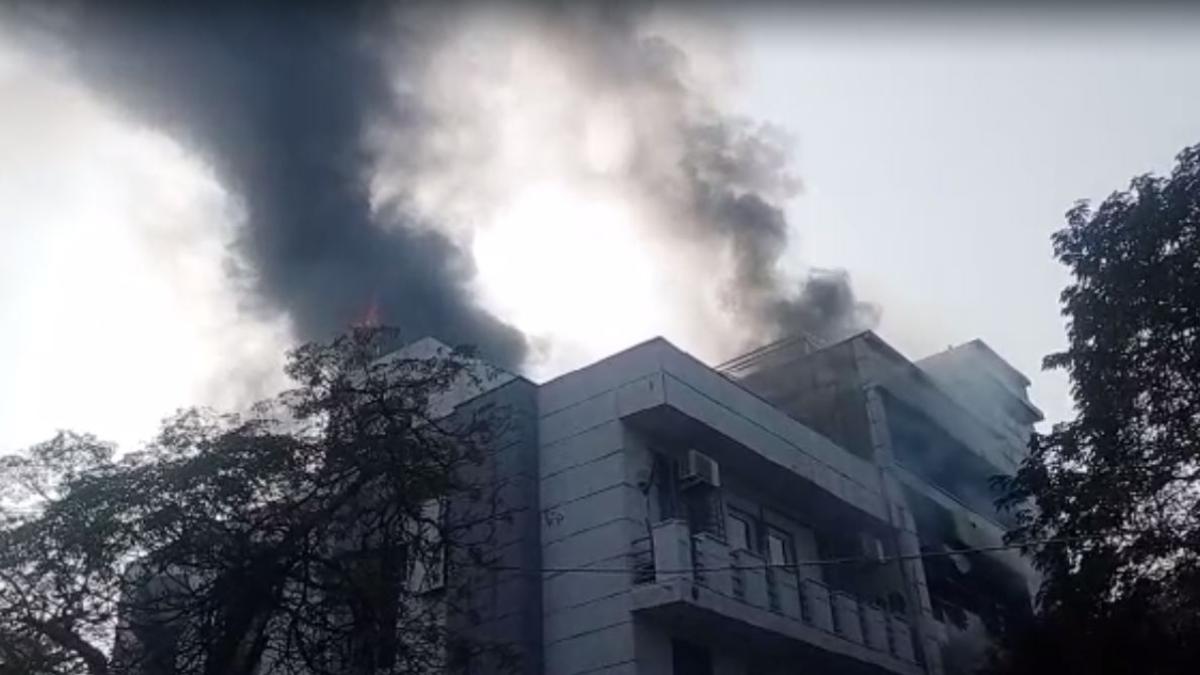


Delhi, the national capital region, is facing severe weather conditions as heavy rainfall and thunderstorms hit the city. Incessant rainfall caused waterlogging and flooding in several parts of Delhi, leading to a chaotic situation. Moreover, a massive fire broke out in a factory in Okhla Phase 2 area, further adding to the chaos. Firefighting efforts are currently underway on the spot. Stay tuned for more updates.
Delhi Reels Under Devastating Weather Conditions Amidst Incessant Rainfall and Fire Outbreak
Background
Delhi, the bustling capital of India, has been battered by unrelenting rainfall and thunderstorms, leading to widespread chaos and disruption. The heavy downpours have inundated streets, causing severe waterlogging and flooding.
Current Situation
On June 28, 2024, the city was particularly hard-hit by the torrential rains. Incessant rainfall submerged several low-lying areas, disrupting traffic and essential services. Many roads were rendered impassable as water levels rose, leaving vehicles stranded and commuters stranded.
Fire Outbreak
Adding to the chaos, a massive fire broke out in a factory in the Okhla Phase 2 area of the city. The blaze engulfed the facility, sending thick plumes of smoke into the sky. Firefighters rushed to the scene and are currently battling to control the inferno. No casualties have been reported so far, but the extent of the damage is yet to be ascertained.
Top 5 FAQs and Answers
1. What caused the heavy rainfall and thunderstorms in Delhi?
A: The severe weather conditions are part of the annual monsoon season in India, where heavy rainfall and thunderstorms are common during this time of year.
2. Which areas of Delhi have been most affected by the flooding?
A: Low-lying areas such as Dwarka, Rohini, and Pitampura have experienced significant waterlogging and flooding.
3. What measures are being taken to address the situation?
A: The municipal authorities and emergency services are working tirelessly to pump out water and clear debris from affected areas. Traffic diversions have been implemented to minimize disruptions.
4. Has the fire outbreak been contained?
A: The fire in Okhla Phase 2 is still ongoing, and firefighters are working to bring the blaze under control.
5. Are there any travel advisories in place due to the weather conditions?
A: Yes, commuters are advised to avoid non-essential travel and to check for updates on road closures before venturing out.

During Prime Minister Narendra Modi's recent visit to Tokyo, the city welcomed him with the soulful chanting of the Gayatri Mantra, one of the most sacred and powerful verses in Indian spiritual tradition. This ancient mantra, found in the Rig Veda, is believed to have a mental healing effect due to its repetitive and focused chanting. Research has also shown that it can improve well-being and provide a sense of peace and connection for both religious and non-religious individuals.

The M3M Foundation unveils 'Payal@40' campaign to commemorate Dr. Payal Kanodia's 40th birthday on December 9, 2025. This campaign, which aims for comprehensive impact across education, healthcare, skill development, and women's empowerment, reflects a leadership approach rooted in service and compassion. With the vision of Dr. Kanodia, the campaign marks a pivotal moment for the Foundation's ongoing mission of equitable development in India.

In a unique move to promote tourism, Madhya Pradesh Chief Minister Mohan Yadav has planned to hold cabinet meetings at famous heritage sites in the state. The latest meeting will take place at Khajuraho Convention Centre, known for its architectural wonders. The two-day visit will also include a jungle safari in Panna Tiger Reserve and review meetings of various departments, highlighting the state's vast natural and cultural beauty.

The main accused and owners of the Goa nightclub where a massive fire killed 25 people have fled to Phuket, according to Goa Police. The police have coordinated with Interpol to apprehend the accused as a Look Out Circular was issued against them. Meanwhile, an employee of the club has been arrested and the postmortem on all 25 deceased has been completed.

Experience a global perspective with the launch of "October 20, 2025e-Paper". Get your daily dose of news and reviews from cinema and streaming in "First Day First Show". Stay updated on the top 5 technology stories with "Today's Cache" and simplify science with "Science For All". Decode the headlines with hard facts in "Data Point" and learn to prioritize your health in "Health Matters". Stay updated on the literary world with "The Hindu On Books". All in one place!

The state of Maharashtra in India has set a new world record for installing the most number of solar agriculture pumps within a single month. The initiative, called 'Magel Tyala Saur Krushipump', saw the installation of 45,911 pumps, which was officially recognized by the Guinness World Records. The achievement was celebrated in a ceremony attended by Chief Minister Devendra Fadnavis.

Explore the historic and stunning Hyderabad House, located at 1, Ashok Road in Delhi near India Gate. Built in the 1920s for the last Nizam of Hyderabad, it boasts 36 rooms with grand stairways, unique European-Mughal style decor and striking marble patterns. After its government takeover in 1974, it has served as a prestigious venue for hosting foreign leaders, state banquets and VVIP meetings, with notable guests including Bill Clinton, Gordon Brown and George W. Bush. Take a virtual tour of this architectural gem and its rich history.

A spiritual education institution in Maharashtra, India is under investigation after a student reported sexual harassment by the head and a teacher. The student spoke out to authorities after being warned not to by the teacher and faced threats of repercussions if she did so. Both accused have been detained for questioning and a thorough investigation is being conducted. The incident has sparked concerns about transparency and external affiliations within the institution.

Environmental activist and founder of nonprofit Chintan, Bharati Chaturvedi, shared a frightening encounter with an Uber driver in Delhi on social media. Chaturvedi alleged that when she tried to stop the driver, he grabbed and twisted her arm and the city's women's helpline did not respond to her distress call. She also expressed frustration at the lack of immediate help and questioned how women in emergencies could reach authorities.

Good Friday 2024, happening two days before Easter Sunday, marks a significant day for Christians worldwide as it commemorates the crucifixion and death of Jesus Christ. It is a time for solemn reflection and contemplation as believers remember the ultimate sacrifice made for them. This year, Good Friday falls on March 29, and will be observed by Christians in various ways, including special services and prayers.